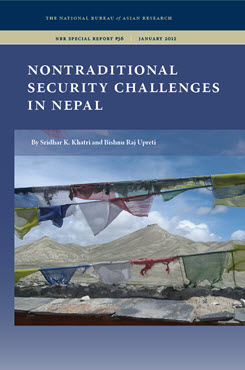Water and Food Insecurity
Nontraditional Security Challenges for Nepal
This essay examines the three most significant challenges related to water and food security for Nepal and analyzes their potential trajectories.
EXECUTIVE SUMMARY
This essay examines the three most significant challenges related to water and food security for Nepal and analyzes their potential trajectories.
MAIN FINDINGS
- Food and water insecurity was one of the structural causes of the armed conflict in Nepal’s mid-western region. Water scarcity and food insecurity in Nepal are not only politicized but also marginalized in policy and practice; these two issues are a perennial source of sociopolitical tension and conflict in Nepal.
- Food production and distribution are among Nepal’s most significant challenges for achieving food and water security. Nepal’s government had to shift financial resources from strengthening local capacity in these areas to supporting the military’s counterinsurgency efforts.
- Land distribution is a second major challenge, with respect to both Nepal’s food and water security and its internal stability. Poor and marginalized people are becoming landless and, upon losing their traditional land rights, vulnerable to food insecurity, as they are unable to meet their families’ food requirements.
- Poor and marginalized people suffer the most from inadequate and poor-quality water supplies, particularly in the Kathmandu Valley. Consequently, many people are suffering from water-related diseases because they must use poor-quality water.
POLICY IMPLICATIONS
- Politicians use insecurity as an opportunity to manipulate poor and marginalized people for political gain, especially during elections. The issues of food insecurity and land and water scarcity will thus become fertile ground for political players to leverage efforts to gain political support or weaken opponents.
- The current policies, strategies, and operational practices of the Nepalese government need a paradigm shift to address the political, economic, and security challenges brought forth by food insecurity and land and water scarcity. Nepal needs to shift investment from the conventional security sector to social sectors such as health and education.


